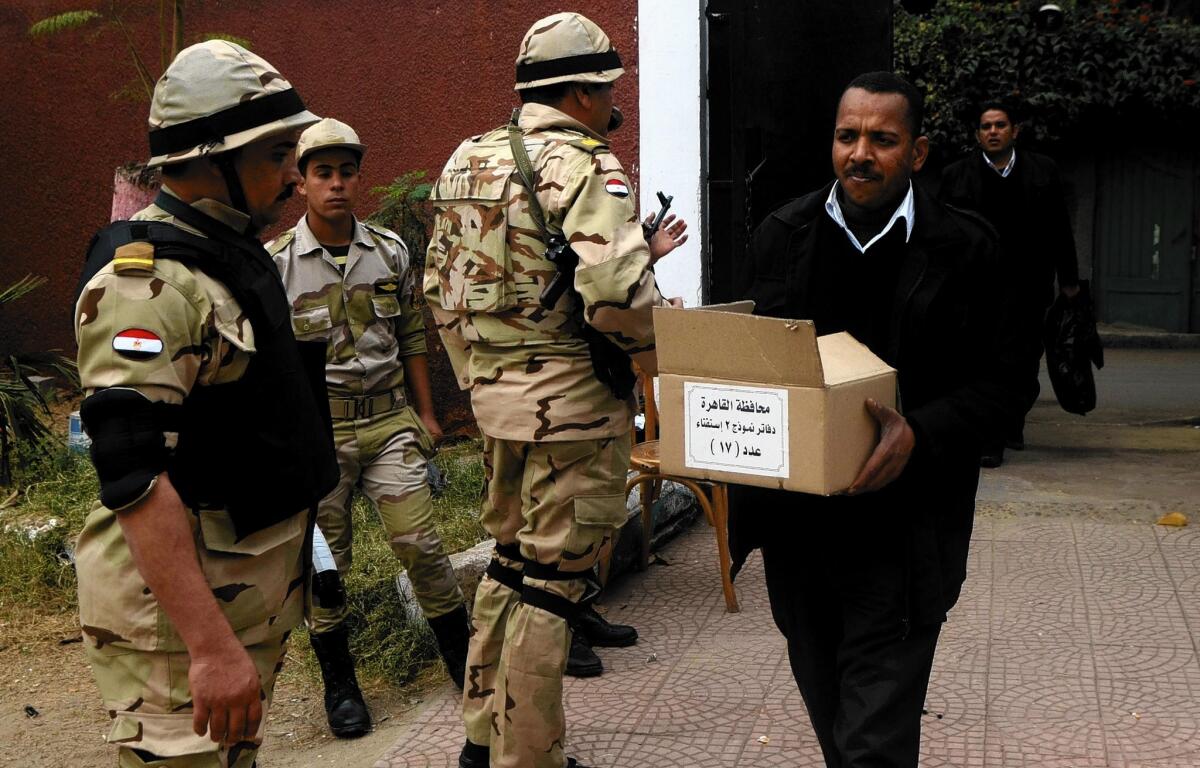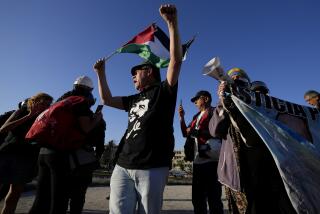Egypt’s vote on new constitution is far from clear-cut

- Share via
CAIRO — The question on the ballot is straightforward: yes or no to a new constitution. But Egypt’s military-backed government has a far more ambitious agenda for a nationwide referendum beginning Tuesday.
In power for just over six months, the interim administration is seeking a symbolic endorsement of the July overthrow of Islamist President Mohamed Morsi, and aiming to cement the authority of Gen. Abdel Fattah Sisi, already the country’s most powerful figure.
Hundreds of thousands of police and soldiers have been mobilized to provide security, and the government has promoted the new national charter with fluttering banners and nonstop laudatory coverage in state-run media. The airwaves for weeks have echoed with catchy pro-constitution jingles.
But the new rulers’ first electoral test, long touted as a democratic milestone, comes against the backdrop of one of the bleakest periods of political repression in modern Egyptian history.
A harsh campaign of arrests and use of deadly force over the last six months has primarily targeted Morsi’s Muslim Brotherhood, which authorities in December branded a terrorist organization.
The state has systematically worked to smash the Brotherhood, the country’s oldest and largest Islamist movement. Nearly every member of its leadership has been imprisoned, fled the country or gone into hiding. Morsi is on trial on multiple charges of capital offense.
Thousands of members of the group have been jailed, many without charge. But authorities have been unable to extinguish street protests by backers of Morsi, which erupt like clockwork every Friday, and Brotherhood members remain in clandestine communication, rebuilding the underground culture on which the group has fallen back many times before.
Authorities have also moved against secular activists, jailing some who were prominent in the uprising that toppled Hosni Mubarak three years ago.
Dissent has been muzzled not only by a law sharply curtailing street protests but also by a climate of nationalistic fervor that has made public criticism of Sisi or the military a virtual taboo.
Even expressing peaceful opposition to the new constitution was a risky business; on Monday, the eve of the first day of voting, New York-based Human Rights Watch expressed concern over the arrests of activists whose only apparent offense was hanging posters urging a no vote in the referendum.
After three years of unrelenting turmoil, however, a longing for stability is foremost in the minds of many Egyptians, even at the cost of diminishing freedoms. To many, Sisi personifies that promise, even though the interim government’s tenure has been marked by repeated bouts of political violence and the emergence in earnest of an Islamist insurgency in the Sinai Peninsula, where the army faces frequent attacks.
“He is strong, and that is what we need now,” said Refaat Hemida, a vendor who sells posters, postcards and DVDs in a ramshackle open-air market in Cairo’s landmark Ramses Square. “He wants what is best for the country, and he knows how to solve our problems. I will vote in the referendum, and I will vote yes.”
The new constitution, drafted by a government-appointed panel, is expected to be approved by a wide margin, as was the previous one, written and voted on during Morsi’s year in office. But a considerably larger turnout during the two days of balloting — perhaps double that of the 35% in the earlier referendum — would be portrayed by authorities as a repudiation of demands by Morsi’s supporters for his reinstatement and a rejection of the Brotherhood’s calls for a boycott of the vote.
It would also suggest an implicit willingness by voters to gloss over the killings of as many as 1,000 Morsi supporters by security forces in mid-August, six weeks after he was overthrown — violence that has remained the rallying cry of his backers.
Protests on Friday, the main day of prayer in the Muslim week, rarely end without fatalities. Clashes between pro- and anti-Morsi forces left at least 50 people dead Oct. 6. Earlier this month, 17 people were killed on one day.
Over the weekend, Sisi appealed to Egyptians to turn out in large numbers to approve the charter. The general also dropped his broadest hint yet that he would view such an outcome as a mandate to seek the presidency in elections to be held this year. He would act, Sisi said, on the will of the people. That is the same phrase often used to justify the military’s deposing of Morsi after huge protests against him.
The enormously popular Sisi would almost certainly emerge as the overwhelming winner in a presidential run. However, the general could choose to continue as de facto head of state with a figurehead president in place, particularly if Egypt’s most crucial benefactors, wealthy Persian Gulf states that have been propping up its economy, prefer that Sisi retain his military role.
Whatever the general decides to do, the new constitution would enhance the military’s clout and diminish civilian oversight of the armed forces. Under the new charter, the military would essentially be in charge of its own budget, control appointment of the defense minister for the next eight years, and be allowed in some cases to try civilians before military tribunals.
The rewritten charter also limits the scope of Islamic law, which had been broadened in the constitution approved under Morsi. It includes provisions meant to promote gender equality and greater personal freedoms. But activists say those ideals are far from Egypt’s reality.
Although the interim government hopes the vote will bolster its legitimacy at home, even relatively peaceful balloting might do little to enhance its standing abroad.
Egypt’s high-profile prosecutions of domestic and foreign nongovernmental organizations after Mubarak’s fall have been left on the books by the current government, leading a number of major international monitoring groups to stay away.
Some, including the U.S.-based Carter Center, have sent delegations to Egypt but limited their activities to surveying the overall political situation rather than scrutinizing the vote itself. Last week, the Carter Center called on the interim government to rescind the protest law and reverse its crackdown on the Brotherhood, neither of which seems likely any time soon.
Despite the deep schism between supporters of the army and the Brotherhood, some Egyptians took a nuanced view of the balloting. Alaa El Deeb, shopping in downtown Cairo, said he voted for Morsi but nonetheless planned to cast a yes vote on the constitution. It was better to try to move on, he said, despite misgivings about how the former president was removed from office.
“Morsi was a big disappointment — he did a terrible job,” he said. “But still, we elected him.”
Special correspondent Amro Hassan contributed to this report.
More to Read
Sign up for Essential California
The most important California stories and recommendations in your inbox every morning.
You may occasionally receive promotional content from the Los Angeles Times.










